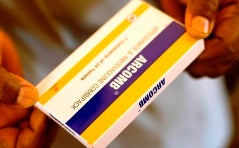 Medicines are key inputs for quality medical care and the prevention of disease, and when administered appropriately, as evidence from Sub-Saharan African countries shows, they can contribute significantly to reducing death rates due to conditions such as HIV/AIDS, tuberculosis, and malaria.
Medicines are key inputs for quality medical care and the prevention of disease, and when administered appropriately, as evidence from Sub-Saharan African countries shows, they can contribute significantly to reducing death rates due to conditions such as HIV/AIDS, tuberculosis, and malaria.
But it is also obvious that not everybody in these countries, particularly the poor, enjoys this benefit, since limited access to essential drugs remains a key challenge in most health systems. High out-of-pocket expenditures, typically more than 40% of total health expenditures in some countries (a large portion for outpatient drugs), also place a heavy burden on poor families with chronically ill members who require daily drug intake.
Facilitating effective access to essential medicines at an affordable price has been a long-standing aspiration of governments across the world. This challenge has become more acute nowadays given the negative impact of the global economic downturn on public budgets that constrain health spending and development aid.
I think that to effectively deal with this challenge, countries need to reinforce the adoption of an essential drugs benefit for the most prevalent diseases, ensuring that decisions about what drugs are included on essential drugs lists and likely volumes are costed, and that the full implications of listing every new drug are taken into account.
But where should additional resources come from to finance this benefit?
An obvious option is to redirect public expenditures toward long-term needs of social sectors such as health, and away from less productive categories of public expenditures (for example, general administration expenditures, or untargeted subsidies and transfers). Another promising option is to increase excise taxes on cigarettes to pay for the drug benefit and improvements in the supply chain for drugs. This option is not only consistent with the Framework Convention on Tobacco Control, which most countries in Sub-Saharan Africa have ratified, but also would have the effect of raising prices to make cigarettes less affordable, encouraging tobacco users to quit and contributing to a reduction in the high cost of treating tobacco-related chronic diseases in the future.
The adoption and implementation of stronger tobacco taxation policies in Sub-Saharan Africa to generate additional funds for health programs is indeed feasible, since 30 out of 46 African nations have a tobacco taxation rate lower than 40% as compared to only 5 out of 53 European countries, or to some Latin American countries, where the rates range from 56% in Costa Rica, 65% in Mexico, and 76% in Chile. A good international example of the application of this option is the decision in February 2009 by the US Government to renew and extend the Children’s Health Insurance Program (CHIPRA) for low-income uninsured children, financed by a 62-cent per-pack increase in the federal cigarette taxes and other tobacco tax increases.
Some people may argue that this type of proposal will only aggravate an already bleak situation given significant evidence that government-provided drugs are stolen (usually by health workers) and sold on the open market, which makes it even harder for poor people to get access to them. Yes, that happens, and the problem is part of institutional weaknesses in the health sector in many countries. But at the same time, there is significant evidence of success stories in other countries.
So, besides adequate funding, it is imperative that ongoing efforts be supported to build resilient institutions and systems to facilitate access to and promote the rational use of medicines.
For example, in Nigeria, as recently reported in The Economist, the government has adopted measures such as a scratch-off label system that have reduced the flow of counterfeit medicines from around half to a tenth in five years. Stronger supply chains for lifesaving drugs—including hiring district-level planners to help manage orders and deliver drugs more efficiently—have proved very effective in Zambia, where pediatric malaria drugs, essential to save children’s lives, have become available in 88% of public health centers in pilot districts, nearly doubling the 51% availability rate in control districts.
Results presented at the 2012 Clinton Global Initiative, showed that in Tanzania, the Medical Stores Department (MSD), leveraging Coca-Cola's expansive distribution system and supply chain expertise, has reduced the delivery times for anti-AIDS drugs and vaccines in 10 rural regions from 30 days to five. Now, the initiative is going to be expanded to cover 75% of Tanzania and include Ghana and Mozambique.
Given the ever-growing number of drug therapies, the lack of access of many physicians to scientific information or enough technical knowledge for making a critical appraisal of new medicines, the adoption of clinical guidelines for specific diseases as done in Botswana is helping improve prescription patterns of physicians avoiding tendencies to overmedicate with little or no benefit for the patient. Equally important are methods to ensure adherence of patients to the prescribed drug regime, such as the directly observed treatment for tuberculosis, that helps prevent the development of drug resistance.
As the implementation of the universal health coverage agenda evolves across African countries, proper attention needs to be placed to ensure timely access to essential medicines taking into account international experiences and ongoing innovative efforts in the countries. The policy decisions that could be adopted in this area will be of crucial importance to improve resource utilization and generate better health outcomes.
RELATED LINKS:
A Practical Approach to Pharmaceutical Policy:
http://issuu.com/world.bank.publications/docs/9780821383865/1?zoomed=&zoomPercent=&zoomX=&zoomY=¬eText=¬eX=¬eY=&viewMode=magazine
http://go.worldbank.org/SZPAB6CMN1
Zambia Study Shows Stronger Supply Chains for Key Drugs can Reduce Child Mortality:
http://go.worldbank.org/V61HKWLUQ1
Bad medicine. The world’s drug supply is global. Governments have failed to keep up
http://www.economist.com/node/21564546
Shanta Devarajan's response to this blog post
http://blogs.worldbank.org/africacan/improving-access-to-drugs-fitting-the-solution-to-the-problem


Join the Conversation